10 memory loss products that offer friendly reminders for daily activities
Never forget the little things
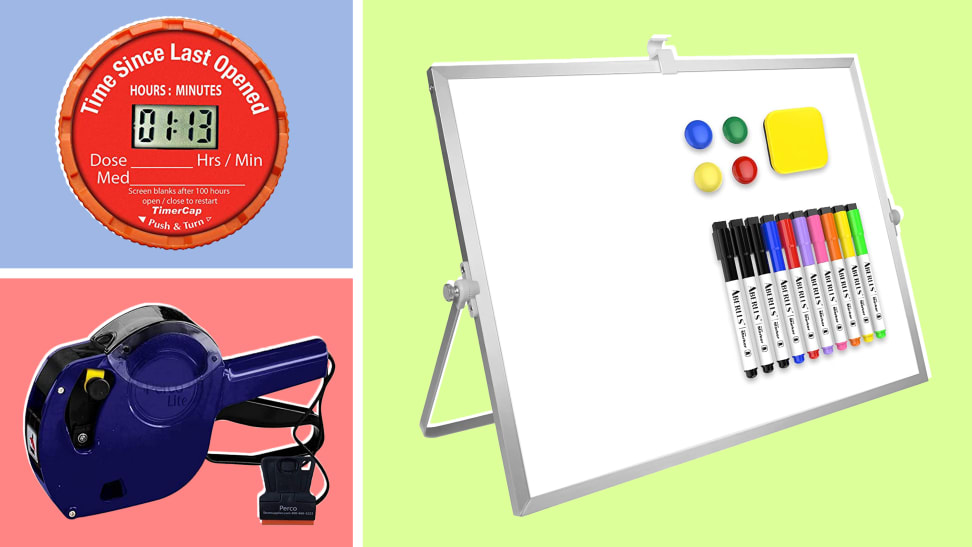 Credit:
Reviewed / TimerCap / Perco / ABERLLS
Credit:
Reviewed / TimerCap / Perco / ABERLLS
Products are chosen independently by our editors. Purchases made through our links may earn us a commission.
For those with memory loss-linked conditions like ADHD, dementia, and Alzheimer’s disease, the right memory aid can be life changing. Whether you’re someone who can never find their keys or you have an ongoing fear of leaving something (or someone) important in the car, these products can help persons with all types of memory loss accomplish daily tasks.
We pulled together 10 helpful memory aids available to buy right now. It should be noted that these friendly reminders are probably best used during the early stages of more progressive conditions, as a system for more strict personal care should be considered as symptoms worsen.
1. Tiles

Similar to Apple's AirTag, the Tile Tracker helps you locate missing items–put these in wallets, keys, and even on pets!
Do you or your loved ones spend half your time looking for misplaced objects? Do you find that small things like remotes, keys, wallets, and phones disappear for days at a time without a trace? The Tile from the Tile Store is here to save the day.
Using a Tile is simple enough to be dementia friendly depending on how fast the dementia progresses. Just attach the black piece to anything you find yourself losing, and install the Tile app on your phone. When you lose a tagged item, you can use the app to locate it in a snap.
If the item is close by, such as in your house with you, you’ll be able to use Bluetooth to “ring” it, thereby causing noise until you are able to locate it. If you are looking for an item that got left elsewhere, the app will show you on a map where the tile was last located.
One of the best things about the Tile system is its sheer versatility. The pack linked above and below provides two keyring Tiles, a Sticker Tile (ideal for a phone, remote, or water bottle), and a Slim Tile intended for a wallet or purse. While you can certainly purchase individual Tiles to fit your precise needs, this set will get you a pretty good start with your most essential items.
2. Backseat car reminder

With the help of a professional for install, the Ride N Remind Car Alarm is guaranteed to provide much needed peace of mind.
For those who drive, one of the most dangerous things that can happen is accidentally leaving a living being in the backseat, whether that be a sleeping child or a quiet pet. Even those who don’t have any form of memory loss or cognitive impairment have days where they get distracted or tired and could benefit from a reminder system. For those who have ongoing memory concerns and frequently transport kids or pets, a backseat reminder alarm is an absolute must.
There are many car notification systems that can stop you from forgetting a small child in the backseat of the car. However, few of them work as well at reminding you about pets, and even fewer remind you about items like groceries. (If you’ve never had a quart of ice cream melt in your car then you may not feel my pain, but trust me, it’s a mess.)
Amazon customers love the Ride N Remind Car Alarm. Though this memory aid comes with a hefty price tag and has to be professionally installed (another good chunk of money), the peace of mind is well worth it. This is especially true if you live a place with extreme temperatures and/or you are likely to be taking a small child or quiet pet with you in your travels.
Unlike other systems, the Ride N Remind doesn’t rely on having your phone, remembering to do anything when you get in the car, or knowing how to use an app. It works by tracking whether the back door is opened before you start the car, and if so, reminds you to return to it when you stop. While no system is truly foolproof, this one may be as close as we’ve come.
3. Timer medication caps

With ADHD, struggling with short-term memory is common. The TimerCap may be the external visual reminder you need.
As a person with ADHD, one of my absolute favorite discoveries has been timer caps for medicine bottles. Though a quick search will show you plenty of options, TimerCap is one of the best known. This deceptively simple invention eliminates the nagging question of “Did I take my medication today?” once and for all. Simply find the right size of cap for your medications, and then switch out the provided cap for your new TimerCap.
From there, the TimerCap automatically keeps track of how long it has been since you last opened the bottle. The setup is instant, and the need to remember future steps is non-existent. It really is as simple as closing the bottle to get the stopwatch to start counting.
The caps come in different colors and sizes to help you easily tell medications apart and to work with whatever pill bottle your pharmacy provides. They also have a handy spot to write the medication name and dosage for each pill you take.
While most are childproof (as you’d expect the average medication cap to be), TimerCap also has an “EZ-Twist” option for most of its caps. If you struggle with childproof caps, this may be the perfect solution. Just keep in mind that, if you do have kids around, an easily opened cap will not be safe from them and should be kept somewhere with extra precautions.
There are lots of clever ways to keep track of pills, but the TimerCaps remain my favorite for ADHD. Because I know I will not remember to set my pills up in one of the monthly or weekly dispensers, this pill cap is more effective.
However, if you’re wanting a fuller view of any missed mediations, or if you simply take a lot of medicine every day, a Hero pill dispenser or one of those weekly/monthly units may work better. Similarly, if a caregiver will be the one separating the medicine, one of the weekly/monthly containers may be more worthwhile.
4. Smartphones

Use your smart phone for more than calls and texts. There are plenty of apps to remind you of any important detail you may forget.
One of the most effective memory aids is the one that is likely right at your fingertips. The average smartphone has a variety of reminders, alarms, and notifications for upcoming events. Most of the best parts of these can be customized, from the sound it makes to the amount of times it will “snooze” and come back. If you have frequent alarms, changing the color and/or sound notification can help you tell them apart and can make any especially important reminders (such as taking medicine) stand out among the rest.
Smartphones also offer a wide range of apps that can help you track everything from important appointments to how much water you’ve had to drink. One of my past favorites was Plant Nanny because I couldn’t take the guilt of letting my plant die (even though my own need for water was evidently easily put off). However, if you prefer your reminder apps guilt-free, or just want a more professional aesthetic, there’s a huge variety out there to choose from.
Whatever you have trouble remembering, there’s probably an app tailored to improving memory across any situation one can think of.
If you don’t already have a capable smartphone or mobile phone that you love, or you’re just ready for a new one, take a look at this list of the best smartphones available in 2023.
5. Food stickers

Labels make bottles and containers easily identifiable—perfect for stored items you haven't seen in a while.
It’s easy to stick something in the fridge and forget it exists long after grocery day. When you add in memory problems resulting from the early stages of Alzheimer’s or dementia, this bad habit can go from a tiny inconvenience to a huge budgetary concern. Rather than throwing out a ton of unused food, or stopping every meal to figure out what might still be edible, consider using some form of a food dating system.
My personal favorite method is using day-of-the-week stickers for fridge items, such as these from QSRP Products. They provide a place to write the date (for those days when you’re really on top of things), but it also means that—even with minimal effort—you’re giving your future self a clue about the mysterious item. By color coding, it’s easy to see which items are from which days, and by using a sticker, it becomes a fun, one-step mark.
If you want a better shot at writing the date with the day of the week, tie a sharpie to a string and tape that string to the box of stickers. This will stop you (or any other “helpful” family members) from taking the sharpie to another room, and it will serve as a visual reminder every time you pick up the sticker. If your memory functions better with something more interactive, a sticker label gun may make the process especially fun. Just remember to change the date so any added information stays correct!
6. Automatic calendar alarm clock

This automatic calendar alarm clock displays large visuals, which are easy to read.
One of the most disorienting aspects of a poor working memory is not always remembering how much time has passed. A clock like this one from Véfaîî can be a huge help, because it not only tells the time in a clear and easy-to-read way, but it also provides more information at a glance.
For instance, with this clock alone, you are told the day of the week, the time of day, and the calendar date. With all of this information, you’re able to better orient yourself to what has happened thus far in the day and what might be coming up. The clock also automatically adjusts itself for daylight saving time and is a snap to set up.
In addition, this clock can be set to different color schemes, making it ideal for those who are visually impaired or colorblind. It can also be programmed with up to 10 alarms, meaning a caregiver or user can set up medication reminders and feel confident they will happen reliably. There are also nap and dimming functions to assist with sleep.
Low-tech notetaking solutions
Beyond the technologically advanced options above, there are some great low-tech dementia products and memory aids to offer you or your loved one friendly reminders as well.
7. A reminder dish

Leaving this handy dish by an entryway ensures misplaced keys are a thing of past.
If the person in question continually forgets something when leaving the house, create a sign to remind them. There are many products in the form of doormats, key holders, or signs to post on the door itself, but one of my favorites is this simple dish.
The reminder at the bottom of the dish tells you exactly what to grab before leaving, and it’s the perfect size to hold your phone, keys, and wallet within it. By keeping together all of the things you’ll need when you leave the house, it’s a lot less likely something will be left behind.
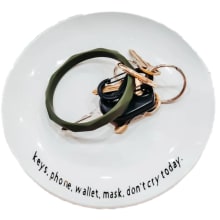
This small dish can be repurposed for jewlery, keys, or other tiny objects you want to keep a close eye on.
8. White board

A large whiteboard can be used to write down your grocery list or timely items.
If you prefer to leave event reminders and other messages somewhere that you’ll always see them, a whiteboard may be the perfect solution. Simply hang a white board (and its markers) on a wall or door that you see often. If you’re hoping to use it for something like groceries, be sure it’s near the kitchen, whereas if it’s for family to leave notes to each other, the front door might be a better spot.
I particularly like this version, but whatever your preferences, make sure the markers stay with the board. Magnetic boards like this one are great for that, but having a cup or drawer nearby that holds them also works.
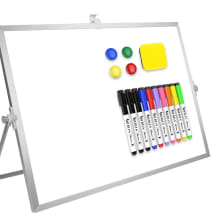
This dry erase board comes equipped with colored markers, a small eraser, and magnets for you to jot freely.
9. Sticky notes

The beauty of Post-It Sticky Notes is they can be placed just about anywhere.
For more permanent notes, many people living with dementia become accustomed to using sticky notes and journals. I personally use sticky notes for all sorts of odd reminders, and make sure that every room where I might need a reminder has a sticky note and pen set.
Getting them in multiple colors helps me with organization and makes it more fun to use them. However, if you prefer neutrals, there are plenty of options for those as well. Just make sure that whatever color you choose makes you happy (so you want to use them and look at them) and draws your attention relative to its surroundings.
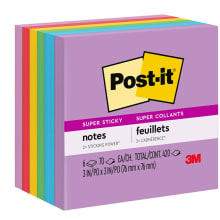
Organize the Post-it Super Sticky Notes by color according to subect and urgency, making your reminders easier to comprehend.
10. A memory journal
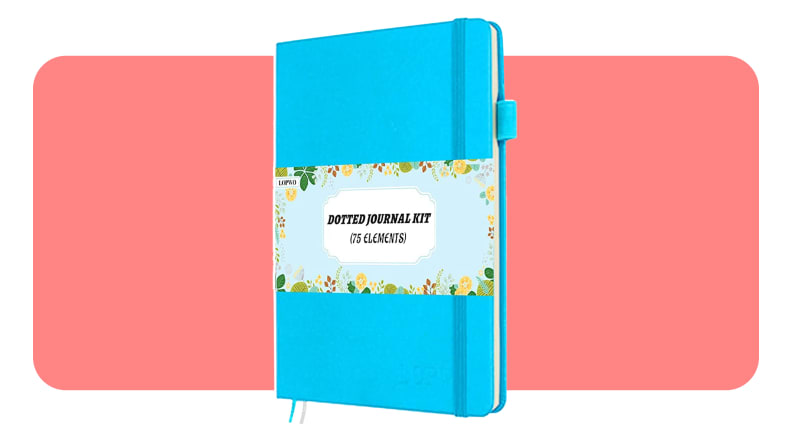
Write down tasks, to-do lists, and upcoming reminders in your own personal journal.
If you like to keep a longer note of your day, or if you’re hoping to keep a record on paper when your memory doesn’t always pull through, a journal can help tremendously as an ADHD and Alzheimer’s product in particular.
Though it can be hard for someone like me who has ADHD to build a new habit like journaling every day, there are routines you can adopt to encourage the process. Find a journal that you love, as well as accessories like stickers and colorful pens, that make the journaling process fun. This LOPWO bullet journal set is a great starter set and also sets you up well if you want to try the famous Bullet Journal method.
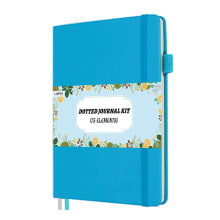
Keep this journal on a desk or nightstand to write important items as they come in.


